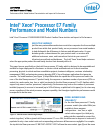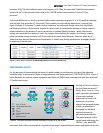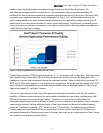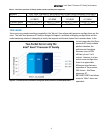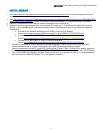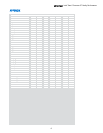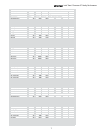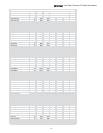
White Paper
Intel® Xeon® Processor E7 Family Performance
2
processor SKU (70); which indicates same core frequency of 2.4 GHz, the same Intel® QuickPath Interconnect
speed of 6.4 GT/s, the same last-level cache (LLC) of 30 MB, and the same number of cores at 10 per
processor.
So the only difference is in the first product family number represents wayness (2, 4, or 8) capability indicating
that the Intel Xeon processor E7-4xxx and E7-8xxx models can scale natively beyond just 2-sockets (see
Figure 2 below). It is common IT practice to buy “headroom” by purchasing a larger server but only initially
partitioning a portion of the processor sockets for today’s level of requirements allowing for future compute
power expansion as the number of users, transactions, or problem fidelity increases. Ideally, with perfect
scaling, you can double the number of users, for example, when doubling the number of processor compute
power (assuming storage, memory, and I/O are scaled as to not be the bottleneck). However, when any of
these otherwise identical processors are populated in 2-sockets only though, performance throughput should
be expected to be the same.
Figure 2 - Intel® Xeon® Processor E7-8800/4800/2800 Product Family Numbering
2
PERFORMANCE IMPACT
For the purposes of demonstrating the impact of model numbers on performance, the top of the advanced
capability levels of each product family is compared below (Intel Xeon processor E7-8870/4870/2870). Figure 3
below illustrates the options original equipment manufacturers (OEMs) have in designing an Intel Xeon processor
E7 family-based server.
Looking at the first number in
the Intel Xeon processor E7
family, -8xxx, -4xxx or -2xxx,
which represents the number
of processors natively
supported in a server, the
processors can scale to
support the increased number
of users, transactions or
throughput as additional
sockets are tested in
performance benchmarks.
The typical example of this
can be found while using the
SPECint*_rate_base2006
benchmark that is fairly representative of typical integer-based, compute-intensive server applications to test the
Figure 3 - Intel Xeon processor E7 family scalability to support 2- to 256-sockets
3



